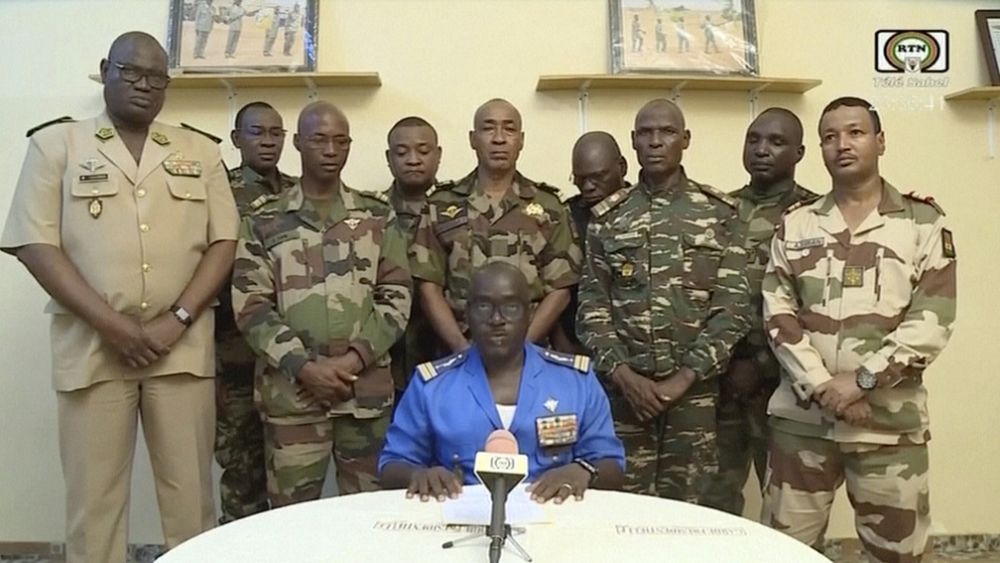
An attempted coup was underway Wednesday in the land-locked state of Niger, where members of the Presidential Guard detained President Mohamed Bazoum, triggering a standoff with the army.
In a TV statement, Nigerien soldiers claimed to have overthrown the government, dissolved the constitution and closed the borders.
Disgruntled members of the elite Presidential Guard sealed off access to the president’s residence and offices in the capital Niamey, and after talks broke down “refused to release the president,” said an anonymous presidential source.
In a message on Twitter, which is being rebranded as X, the president’s office said “Elements of the Presidential Guard (PG) had a fit of temper… (and) tried unsuccessfully to gain the support of the national armed forces and the national guard.”
“The army and national guard are ready to attack the elements of the PG who are involved in this fit of temper if they do not return to a better disposition,” the presidency said.
It is uncertain why the Guard revolted, analysts say that the rising cost of living, perceived government incompetence as well as corruption may have been contributing factors.
International condemnation
The act drew both national and international criticism, denounced by the African Union, the UN, the EU, France and the US.
UN chief Antonio Guterres condemned “any effort to seize power by force” while the United States expressed deep concern and called for Bazoum to be released.
ECOWAS also called for Bazoum’s immediate and unconditional release and warned that all those involved would be held responsible for his safety.
The European Union said it “associated itself” with the ECOWAS statement and attacked “any attempt to destabilise democracy and threaten the stability” of Niger.
The head of the West African bloc ECOWAS said Benin President Patrick Talon was heading to Niger on a mediation bid after the region was struck by a new bout of turbulence.
“No Coup d’Etat”
Supporters of President Bazoum took to the streets of Niger’s capital Niamey, to protest the coup.
According to AFP, hours after the act, they tried to approach the presidential complex where the head of state and his family were being held but were dispersed by members of the Presidential Guard who fired warning shots.
One person was hurt but it was it is unclear whether the injury was from a bullet or from falling down when the crowd scattered.
Niger’s political history
Niger has experienced four coups since independence from France in 1960 as well as numerous other attempts at power.
President Bazoum is one of a dwindling group of pro-western leaders in the Sahel. Elected in 2021, he took the helm of a country burdened by poverty and a history of chronic instability.
As interior minister, he was the right-hand man to former president Mahamadou Issoufou, who voluntarily stepped down after two terms.
Their handover in April 2021, after elections won by Bazoum in a two-round contest against former president Mahamane Ousmane, marked Niger’s first peaceful transition of power since independence.
But reminders of the troubled past have never been far.
An attempted coup occurred just days before Bazoum’s inauguration, according to a security source at the time.
Several people were arrested, including the suspected ringleader, an air force captain named Sani Gourouza, and Ousmane Cisse, a former interior minister under a military government of transition.
Five people, including Gourouza, were jailed in February for 20 years while Cisse was acquitted.
A second bid to oust Bazoum occurred in March this year “while the president… was in Turkey”, according to a Niger official, who said an arrest was made. The authorities have never commented publicly on the incident.
Poverty and jihadism
A landlocked state in the heart of the scorching Sahel, Niger is two-thirds desert and frequently ranks at the bottom of the UN’s Human Development Index, a benchmark of prosperity.
It has a surging population of 22.4 million, driven by a birth rate averaging seven children per woman.
The country is struggling with two jihadist campaigns –one in the southwest, which swept in from Mali in 2015, and the other in the southeast, involving jihadists from northeastern Nigeria.
Hundreds of thousands of people have fled their homes, stoking a humanitarian crisis and further straining the economy.
The poorly equipped military is receiving training and logistical support from the United States and France, which have bases there.
Last year, Niger became the hub of France’s anti-jihadist operations in the Sahel.
The mission was reconfigured after French forces quit Mali and Burkina Faso after falling out with the ruling juntas in those countries.





